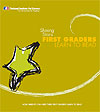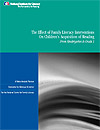|
 |
Shining Stars - Kindergartners Learn to Read (October 2006)
For Kindergartners: Parents are their child's first and most important teacher. Each booklet in this series includes activities to help build a child's reading skills and tells a Parent's Story of how a mom or dad helps a child learn to read.
PDF format (369KB), HTML (accessible format)
|
 |
Shining Stars - First Graders Learn to Read (October 2006)
For First-Graders: Parents are their child's first and most important teacher. Each booklet in this series includes activities to help build a child's reading skills and tells a Parent's Story of how a mom or dad helps a child learn to read.
PDF format (314KB), HTML (accessible format)
|
 |
Shining Stars - Second & Third Graders Learn to Read (October 2006)
For Second & Third Graders: Parents are their child's first and most important teacher. Each booklet in this series includes activities to help build a child's reading skills and tells a Parent's Story of how a mom or dad helps a child learn to read.
PDF format (400KB), HTML (accessible format)
|
 |
The Effect of Family Literacy Interventions On Children's Acquisition of Reading (October 2006)
A Meta-Analytic Review conducted by Monique Sénéchal
Educators believe that parents can help their children learn to read. But what is the evidence that supports this idea? This brief report, designed for teachers, reviews the scientific literature on parent involvement in the acquisition of reading from kindergarten to 3rd grade. It finds that home teaching and parent listening enhance children's literacy skills. The report provides guidance for educators in deciding what type of intervention to implement.
PDF format (790KB), HTML (accessible format)
|
 |
Big Dreams - A Family Book About Reading (October 2006)
This family booklet about reading is aimed at parents of children in Preschool through 3rd Grade. The simple text provides ideas for parents of all literacy skill levels to read with their children and find lessons for reading in everyday activities.
PDF format (790KB), HTML (accessible format)
|
 |
Dad's Playbook: Coaching Kids to Read (September 2006)
By taking the time to read to and with their children, fathers can play an important role in helping children learn to read. Dad's Playbook tells the stories of 20 dads from different walks of life who are giving their kids the best shot at a bright future by helping them learn to read. This publication also teaches dads about the five skills children need to be readers by third grade and helps dads incorporate reading into everyday activities.
PDF format (705KB), HTML (accessible format)
|
 |
What is Scientifically Based Research? (Fall 2005)
A shorter version of Using Research and Reason in Education, this brochure outlines the basic methods of evaluating educational research and using the scientific method in the classroom.
PDF format (460K), HTML (accessible format)
|
 |
La Lectura es lo Primero
Cómo ayudar a su hijo a aprender a leer
This brochure, offered for the first time in Spanish, provides a quick overview of the findings of the National Reading Panel for parents and gives ideas for what to expect from a school's reading program based on evidence from the research (preschool through grade 3). The brochure also suggests ways parents can reinforce reading instruction at home with everyday activities and interactions.
PDF format (230K), HTML (accessible format)
Order this document: edpuborders@edpubs.org |
 |
Using Research and Reason in Education
Paula J. Stanovich and Keith E. Stanovich
Teachers believe in the power of information, but the rush of school life makes it difficult to stay current with the research on effective instruction. This brief paper will help teachers become discerning consumers of educational programs and materials. It provides guidance on how to recognize scientifically based instructional strategies, and how to use the concepts of research in the classroom.
PDF format (330K), HTML (accessible format)
This document will be available soon from EDPubs.
|
 |
A Child Becomes a Reader
Proven Ideas for Parents from Research--Kindergarten through Grade Three
The road to becoming a reader begins the day a child is born and continues through the end of third grade. At that point, a child must read with ease and understanding to take advantage of the learning opportunities in fourth grade and beyond. This booklet offers advice for parents of children from grades K-3 on how to support reading development at home, and how to recognize effective instruction in their children's classrooms.
PDF format (514K), HTML (accessible format)
Order this document: edpuborders@edpubs.org
|
 |
Put Reading First
The Research Building Blocks for Teaching Children to Read
This 64-page booklet provides teachers with a summary of the findings of the National Reading Panel from its
review of reading research. Organized by major reading topic for kindergarten through grade 3 (phonemic awareness
instruction, phonics instruction, vocabulary instruction, fluency instruction, and text comprehension instruction),
the booklet lists the main findings from the research, suggests how the findings can be translated to practice,
and answers some frequently asked questions about each topic.
PDF format (640 KB), Color PDF format (1.24 MB), HTML (accessible format)
Order this document: edpuborders@edpubs.org |
 |
Put Reading First
Helping Your Child Learn to Read - A Parent Guide
This brochure, designed for parents, provides a quick overview of the findings of the National Reading
Panel and gives ideas for what to expect from a school's reading program based on evidence from the
research (preschool through grade 3). The brochure also suggests ways parents can reinforce reading instruction
at home with everyday activities and interactions.
PDF format (816K), HTML (accessible format)
Order this document: edpuborders@edpubs.org |
 |
Report of the National Reading Panel
Teaching Children to Read
An Evidence-Based Assessment of the Scientific Research Literature on Reading
And Its Implications for Reading Instruction-Reports of the Subgroups
This document contains the full report of the National Reading Panel, which was created by Congress in
1997 to review the research on reading instruction and identify those practices proven effective through
quality research. The report contains sections on seven major topics in reading instruction for kindergarten
through grade 3: phonemic awareness, phonics, fluency, vocabulary, text comprehension, computer technology,
and teacher education. This highly-detailed report is designed for educators, teachers, and policy-makers
interested in a thorough grounding in evidence-based reading research. The NRP also offers a summary of this report and a video.
Order this document
This document can be ordered or downloaded at no cost at
www.nationalreadingpanel.org
or
National Institute for Literacy at EdPubs
PO Box 1398
Jessup, MD 20794-1398
800-228-8813
fax 301-470-1244
edpuborders@edpubs.org |
 |
Teaching Reading IS Rocket Science:
What Expert Teachers of Reading Should Know and Be Able to Do
This report from the American Federation of Teachers discusses the current state of teacher preparation in reading. It reviews the reading research and describes the knowledge base that is essential for teacher candidates and practicing teachers to master if they are to be successful in teaching all children to read well. Finally, this report makes recommendations for improving the system of teacher education and professional development.
Download this document |
 |
When Stars Read
This video, produced by the Eunice Kennedy Shriver National Institute of Child Health and Human
Development (NICHD), addresses reading success and the consequences, including the psychological
and social consequences, of reading failure. Produced in 1999; 13 minutes.
Order this video
The NICHD Information Resource Center
P.O.Box 3006
Rockville, Maryland 20847
1-800-370-2943
Email NICHDInformationResourceCenter@mail.nih.gov |
|
Every Child Reading:
A Professional Development Guide Executive Summary
A companion to Every Child Reading: An Action Plan, this publication by the Learning First Alliance provides a blueprint for professional development that is responsive to the need to base reading instruction on evidence-based research. Published November 2000.
Download at http://learningfirst.org/publications/reading/
Order by calling (800) 933-2723, extension 2 or at http://shop.ascd.org. |
|
|